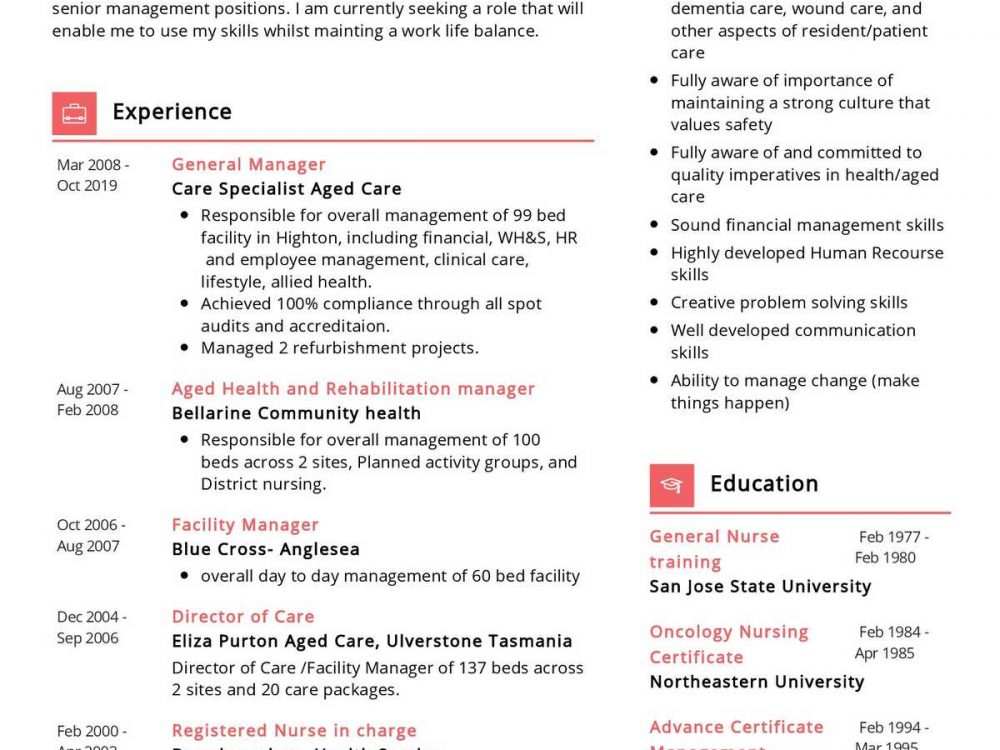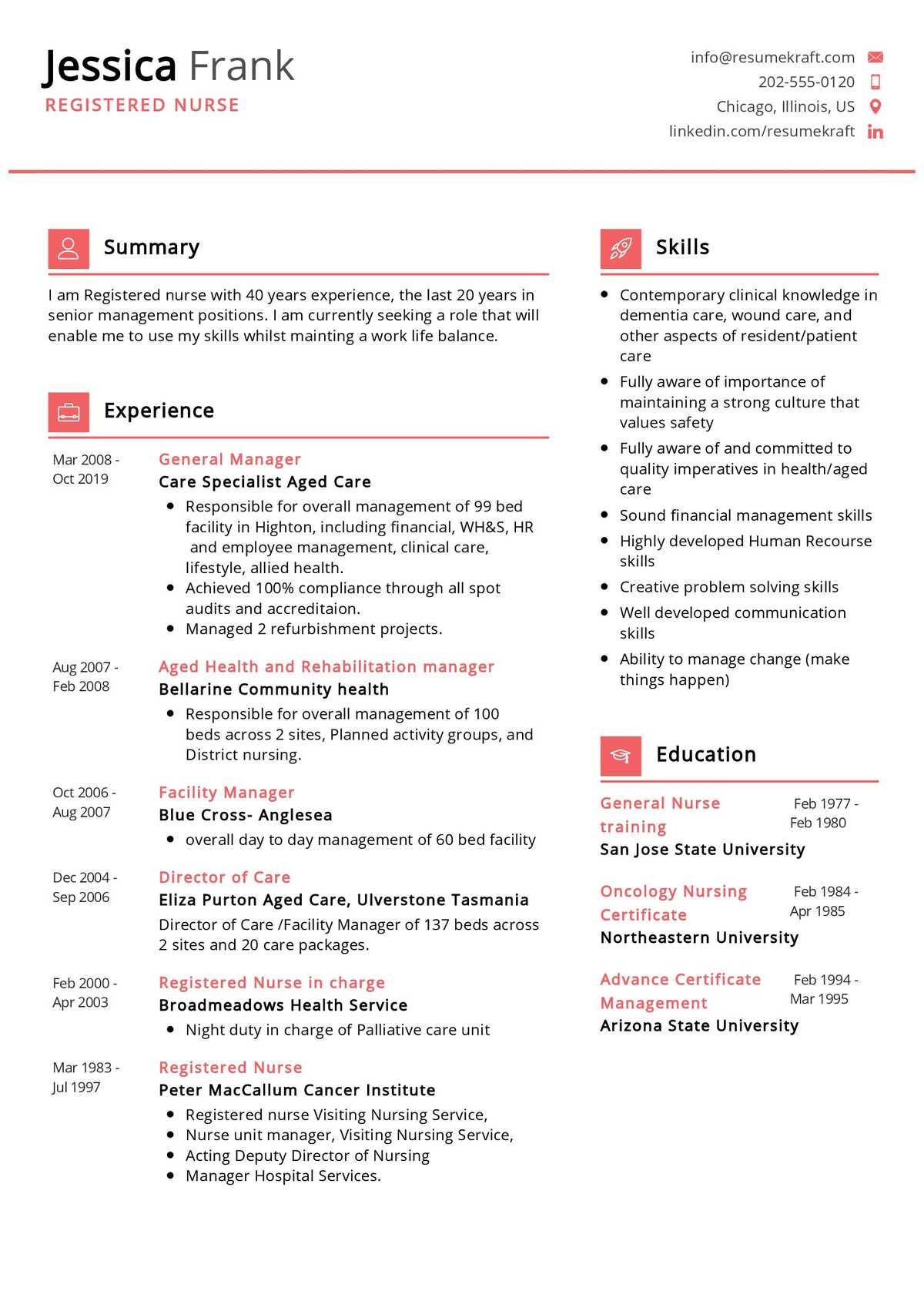Are you a Registered Nurse by profession and looking for an exciting career? We have good news for you! use our professional Senior Registered Nurse Resume Sample. You don’t have to start writing from scratch. Just click “Edit Resume” and modify it with your details. Update the template fonts and colors to have the best chance of landing your dream job. Find more resume samples.
Career Expert Tips:
- Always make sure you choose the perfect resume format to suit your professional experience.
- Ensure that you know how to write a resume in a way that highlights your competencies.
- Check the expert curated popular good CV and resume examples
How to write a Registered Nurse Resume?
How do you get your RN resume to rise above all those other qualified applicants? Understand what a potential employer is looking for and learn how to tailor your resume and cover letter accordingly. Follow these step-by-step instructions for a professional and streamlined resume, with tips from industry professionals. Writing the perfect RN resume is easy if you follow this guide!
Guide to writing a Registered Nurse Resume:
1. What employers are looking for
Identify the job function that describes your skills and experience: One-page summary of qualifications (summary = objective) = Objective statement (goal) List the skills and experience that relate directly to the job description: List any certificates, endorsements, licenses, or training associated with your professional experience. Use key words from the job objective: List keywords of the job description. Make sure to state your job title: List your job title and include dates of employment. Include everything that you have done that is relevant to the job. Whenever possible, quantify your results: Use numbers (numbers = power). Whenever possible, include an example of personal achievement: If it is relevant, use illustrative examples in story form.
2. What to avoid when writing a Registered Nurse Resume
Do not use generalizations: Be specific. Do not be negative: Eliminate any negative information. Do not include strictly personal information: List only education and experience relevant to the job description. Do not attempt to be clever: Your resume is designed to sell you, and it should speak for itself without gimmicks. Do not use a chronological resume unless your experience is precisely related to the job description: Use an appropriate format for your skills and experience. Do not include extraneous information: Keywords are important. Do not oversell yourself [filler verbiage]: The purpose of your resume is to highlight your experience in a positive light. Do not rely on the employer to do your work for you: Resume writing is an “inside job”—the more effort you put into it, the better results you will achieve.
3. How to customize your Registered Nurse Resume
Begin with a statement of objective: Update your objective statement before you begin your resume. Customize it to reflect the skills and experience most closely related to the job description. Transfer key skills and training into the format used in the job posting: Transfer any pertinent training and/or certificates into the format required by your target position. Be sure that they are listed under the appropriate header (education, training, etc.). Make sure your job titles include the full name of the hospital: Include the full name of the hospital in each of your job titles. Quantify your results: Use numbers when possible.
4. Referrals
Referral sources are very important. The person listed on your resume as a referral source must be able to verify that you are qualified for the position you are seeking, and he or she also must be trusted by the employer. It is not necessary to have a referral, but it will help your resume get noticed if it does. Include only three referrals: Too many referrals can confuse the reader and detract from your message; three is a good number to use in most cases. Referrals can help you by providing a letter of recommendation or verifying your employment history. Choose a professional that is credible to the employer: Consider an RN supervisor as one of your referral sources if relevant.
5. When you finish writing your Registered Nurse Resume
Proofread for spelling and grammar errors: Check each line for spelling and grammar errors, which will greatly detract from the professionalism of your resume. Use spell check and then have someone else proofread your resume: Proofread your resume for mistakes. It is also a good idea to use some of the additional resources available. Have a professional proofread your resume: Your friends and family miss things when they read your resume. You need someone who is unfamiliar with you and your experience to help you determine if there are any errors, inconsistencies, or gaps in reasoning.
Registered Nurse Responsibilities:
- As a Registered Nurse, you’ll provide excellent care for patients, while maintaining the highest standards of nursing care.
- Registered Nurses are caring, skilled professionals who are committed to quality patient care.
- As members of the nursing profession, Registered Nurses follow the principles of caring, compassion, and total patient care by maintaining health and safety while providing care.
- The primary focus of Registered Nurses is to promote and restore patient health through the diagnosis and treatment of illness, injury, and other physical/mental disorders.
- The responsibilities of a Registered Nurse vary by area of specialization. General duties include responding to emergencies, taking vital signs, completing medical records, and teaching patients how to take care of their own health.
- As a member of the health care team, Registered Nurses play an active role in implementing treatment plans through monitoring patient progress and adapting to changing needs.
- Our Registered Nurses are trained in a variety of specialties, which may include pediatrics, cardiac care, or oncology. These highly skilled professionals also work with other members of the health care team to develop individualized treatment plans for each patient.
- It is essential that our Registered Nurses are current on any new technology or breakthroughs in their field. We believe it’s important that our health care professionals are given the chance to participate in continuing education and training.
Top 10 Must-have Registered Nurse Skills:
- Interpersonal Skills: You must be good at interacting with people. People skills are an essential part of being a Registered Nurse. It is important that you can communicate and connect with others.
- Problem Solving Skills: Patients’ problems can be difficult to understand and solve, but you must be able to take the time to solve them.
- Documenting Skills: The ability to write is highly desired by Registered Nurses so they can make accurate notes regarding patient’s illness, treatment, and progress in the hospital or clinic setting.
- Management Skills: Registered Nurses are required to be responsible and organized in their daily work. Management skills allow Registered Nurses to plan, organize, and make decisions regarding their workload.
- Interpersonal Communication Skills: This is a vital skill that enables Registered Nurses to effectively interact with patients, families, co-workers, supervisors and other health care professionals.
- Problem Solving: As a Registered Nurse you will encounter many different situations where you must solve problems. There will be times when something has gone wrong, and you will have to take action. Some of these may involve equipment failures, a lack of a supply, or an unusually high number of patients.
- Critical Thinking: Critical thinking is important for Registered Nurses because they must think about the best way to care for their patients based on the situation. Critical thinking enables them to make good decisions in emergency situations and to know how to act quickly.
- Intake Procedures: The creation of an accurate intake form is essential for Registered Nurses. This allows them to track patient information and keep a record of services rendered.
- Communication Skills: Registered Nurses must be able to communicate effectively with the people in the hospital or clinic setting. This includes being able to listen, answer questions, and give explanations when necessary.
- Teaching Skills: The ability to teach can make all the difference in how patients feel about their visit to the hospital or clinic setting.
Tips to write a Registered Nurse Cover Letter:
- State the name of the hospital or clinic and the city where you wish to work as well as your desired position in the cover letter
- In your cover letter, tell them how you will be able to help the hospital as well as what you would be able to do for them if hired
- Use bullet points when writing in order to keep it clear and understandable
- Do not write a long letter; that’s why it’s called a “cover” letter because it should only be enough information for them to see why they should consider you.
Key Takeaways:
- Know your strengths and how you would be able to help the hospital or clinic.
- Be prepared, be professional and be on time.
- Look for a position where you would excel; because when you find that one job, no one else will be able to beat it out of you!
- Take some steps to market yourself, so that not only can you get the job but also find some job opportunities in the future as well.


